#dungones and dragons
Explore tagged Tumblr posts
Text
Gale Portrait! ✨💜
I usually don’t draw him much but I’ve always have a soft spot in my heart for this man 😌


#baldur’s gate 3#bg3#bg3 fanart#larian studios#gale dekarios#gale of waterdeep#bg3 gale#portrait#fanart#digital art#illustration#art#procreate#dnd#dungons and dragons#wizard
2K notes
·
View notes
Text

come watch my d&d campaign, we’ve got this guy ^^^
#dnd#dungons and dragons#d&d#dnd stream#dnd 5e#dnd5e#dnd character#dnd art#dnd ocs#artists on tumblr#animated gif#poe
200 notes
·
View notes
Text

[1004] is he dancing or walking
#this is inspired by the dungon meshi 2024 promo comic#where lios terrorises Marc by pretending to be a dragon#i think he's scutting twords her is very funny#etho#ethoslab#etho fanart#day 1004#edit: I ment the dungon meshi 2024 CHINESE new year promo art if anyone cared lmao#edit: sorry for all the typos I tooka meletonin mimimimi I
242 notes
·
View notes
Text
Why You Should Try Eureka: Investigative Urban Fantasy Part 5: It Revolutionizes Investigation and Mystery Solving in TTRPGs
This is part 5 of a multi-part series of posts about the awesome features of Eureka: Investigative Urban Fantasy, in no particular order.
Find the earlier parts here:
Part 1 Link: We Worked Hard on It!
Part 2 Link: It's Easy to Learn!
Part 3 Link: It's Easy to GM!
Part 4 Link: It's Easy to GM and Supports Narrative and Roleplay!
Finally, we’re getting to some actual game mechanics here.
It’s called Eureka: Investigative Urban Fantasy for a reason. The party investigates. They’re not cops, and it’s not a police procedural. They could be private eyes, investigative reporters, meddling kids, you name it. The PCs are normal people like you and me who come together to solve some kind of mystery that involves them or their friends and loved ones, and these mystery investigations can take place just about any time between the late 1800s and the present day.
A lot of Eureka’s main mechanics are about investigating, and they solve the #1 problem that mystery investigation campaigns run up against: Getting stuck.
Dungeons&Dragons 5e is not a game about investigating, it’s a game about combat, and so when you try to run an investigation or mystery in it, you’ll find that PCs have a Skill called “Investigate” and a Skill called “Senses” and the whole rest of their abilities are dedicated to combat. This isn’t a bad thing if you’re running a campaign focused on combat, but for whatever reason (marketing), most people aren’t. So, the party rolls Investigate, and they fail, and they roll Senses, and they fail, and then they have exhausted all of their options for continuing the campaign. So, the GM has to pull a deus ex machina to make the clue fall into their lap. That isn’t satisfying or fun for anyone, what was the point of even rolling the dice?
Call of Cthulhu is has been one of the top contenders in the TTRPG scene for investigative gameplay for nearly fifty years, and it does investigative gameplay much better. (Eureka takes a lot of inspiration from Call of Cthulhu, if you want to evolve and advance, you have to look to the past.) PCs have a whole slew of Skills related to investigation, unfortunately often too many. New players tend to be unsure where to put the skill points, and it’s a frequent occurrence that they simply won’t have a high enough rating in (what they didn’t know would be) an important skill to find an important clue relating to it, so they fail, and then they have exhausted all of their options for continuing the campaign. So, the GM has to pull a deus ex machina to make the clue fall into their lap. That isn’t satisfying or fun for anyone, what was the point of even rolling the dice? Besides, is that really congruent with Lovecraftian horror? The assurance that the universe cares about your success and no matter what, it’ll all work out somehow? Delta Green has this exact same issue.
Gumshoe, a more recent contender, also does investigative gameplay a lot better than D&D, but also kind of has the opposite problem from Call of Cthulhu, not enough mechanical guidance. It’s easily possible for a PC not to have the skill required to get any information out of an important clue, even though they can’t fail the dice roll if they do have it.
Eureka’s design goals are to improve on these, and learn from previous attempts in the design space to make advances in how investigative gameplay in TTRPGs is done. We really think it should not be the GM’s responsibility to bend the universe over backwards to make sure the party succeeds (or at least fails in a satisfying way). The game itself should be doing that.
Eureka PCs have a base set of 21 Skills, each of which is broad enough to encompass many different use cases, and then an assortment of “Write-In” Skills that are optional, and often more specialized.
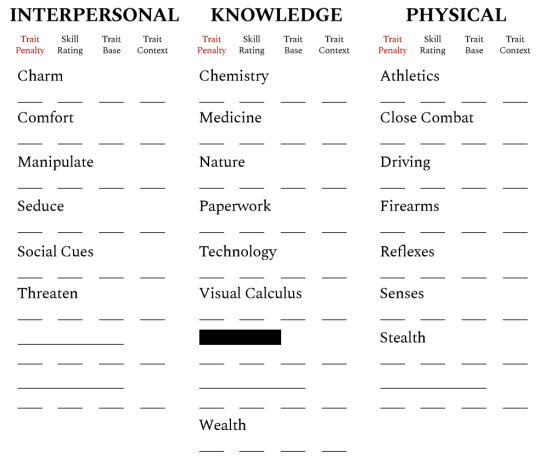
Like Gumshoe, there isn’t really a roll for finding clues. When PCs walk into a room, they simply see/hear/smell everything that they would be able to from where they’re standing. If the gun is on the floor, they just see the gun on the floor. If the gun is under the couch out of view, but a player says “My character gets down on the floor and looks under the couch.”, then they just see the gun under the couch.
Dice rolls are used in investigation, however, and all Skills are investigation skills. If the PC is trying to determine if the gun is chambered for the same caliber of bullet that killed the victim, that might be a Firearms roll (the same skill that determines their ability to effectively use firearms in combat). (If the investigator doesn’t have the relevant specialized Write-In Skill, they can still make a skill check, they’re just very very likely to Fail it.)
Eureka has three degrees of success for dice rolls: Full Success, Partial Success, and Failure. It depends a lot on the context and the clue itself, so I won’t get into Full Successes and Partial Successes in this post, we’re going to focus on Failures. If they Fail, they usually get no useful information.
Above, I criticized Call of Cthulhu and D&D5e for allowing dice failures to halt the investigation completely, forcing the GM to pull a deus ex machina to keep things going. So, is that a problem in Eureka? No!
When PCs in Eureka make skill checks to investigate things, they always build up Investigation Points.
1 for a Full Success
2 for a Partial Success
And 3 for a Failure
These points represent the PC themselves going over the facts of the case in their mind at the same time you are. For every 15 Investigation Points saved up, the PC gets a Eureka! Point. Eureka! Points can be spent on a wide variety of things depending on the PC’s build, but there’s two universal Eureka! Point abilities that all PCs have, and one of those is to have a “Eureka! Moment.”
This is exactly what it sounds like. Something clicks in their brain, and they finally understand something that they had been trying to piece together this whole time. This reverses one of their previously Failed (or in some cases Partially Succeeded) investigation rolls of your choice, providing the information that roll would have granted with a Full Success.
This serves as an “un-stucker” or “rubber-band” mechanic that keeps the PCs in the mystery without the GM having to pull anything out of their ass, but at the same time doesn’t make Failure meaningless. If they’re stuck, it encourages them to pursue other avenues of investigation and keep racking up those points until things start to click into place.
This also still doesn’t mean that the PCs are guaranteed eventual success. Time pressure and mortal danger also stand in their way, which we will get to in future parts of this series, you and your PC will have to use your brains if you want them to get out alive with the answers they seek.

#d&d 5e#call of cthulhu#gumshoe#delta green#indie ttrpg#dungons and dragons#dnd#dnd5e#dungeons & dragons#dungeon master#ttrpg#ttrpg tumblr#ttrpg community#eureka#eureka: investigative urban fantasy#rpg#eureka ttrpg#ttrpgs#dungeons and dragons#indie ttrpgs#ttrpg design
247 notes
·
View notes
Text
Half of the D&D memes on Reddit: ok so what if the warlock was evil and mischievous and the paladin was a goody two shoes? Wouldn’t that be hilarious?!?!?
Bg3: Ok so the Warlock is probably going to be the only person in your party who will disapprove of killing little Timmy and pissing on his moms grave and the paladin wants you to hit the second tower
#d&d#dungons and dragons#bg3#baldurs gate 3#minthara#minthara bg3#wyll ravengard#bg3 wyll#meme#Reddit#paladin#warlock
534 notes
·
View notes
Text

another dragon. NOT a pony for scale. theres still more. i need a lot of dragons for the next chapter of my ttrpg campaign. without spoiling too much for the people who are totally in my campaign and will see this: the thing these dragons all have in common is that they play with ponies like pokemon
here’s the last one i made and heres the next one
#mlp dragon#dragon#ttrpg#ttrpg art#mlp ttrpg#my little pony#mlpfim#mlp#my little pony dragon#friendship is magic#mlp fanart#mlp oc#dragon art#dragon oc#dungons and dragons#captain zigo#sea monster
84 notes
·
View notes
Text

A commission for a patron.
822 notes
·
View notes
Text

anyway, dragon au Chilchuck based on the Chimera AU i have going on :3i loved the markings there,so i decided to make it into a thing..
#my art#art#digital art#doodle#dragon#artists on tumblr#fanart#dragon au#alternative universe#chilchuck#chilchuck tims#delicious in dungeon#dungon meshi#dungmeshi#fantasy
158 notes
·
View notes
Text

Will happen, happening, happened Will happen, happening, happened And there we are again and again 'Cause you and I will always be back then
You have no idea how much I love these guys, y'all, it's hard for me to believe that they only exist in mine and a handful of other people's minds.
featureing @viridiandruid's campaign's NPCs
@theboombardbox PC Jessie,
@halfandhalfling's PC Sash
@recoveringrevenant's PC Kiri
#illustration#artists on tumblr#dnd#dungeons and dragons#drawing#oc#player character#artist on tumblr#dungons and dragons
28 notes
·
View notes
Text


The Mighty Tart's pissed off the wrong apocalypse cult and need to go low profile for the foreseeable. Nowhere's using magic to appear as a human, I wanted a go at designing the disguise.
When the party first met Nowhere, she was someone who hid herself from everyone. She didn't have disguise self magic yet but the big scarf she wears now to hide the pirate brand on her neck was originally a scarf/hood/cloak combo thingy. The clothes she wore covered a lot more of her body as well and her hair was shorter and covered her face. She became first mate of the Tart and started building her confidence and by the time she was promoted to captain she had no interest in hiding her identity. No one wants to fuck with the legendary demon first mate (outdated title) and when she rocks up to a port, she's almost daring them to. It almost goes against her beliefs to adopt a disguise at this point but she's doing what she has to to keep everyone safe.
#artists on tumblr#dnd art#dungons and dragons#tiefling#rogue#character design#rapier#pirate#captain
34 notes
·
View notes
Text

A commission I got to do for the wonderful Amanda! Their witchy character fun to design!
#illustration#art#art commission#figure#portrait#art commissions#fantasy#dnd#dungons and dragons#witch#ink
782 notes
·
View notes
Text
Tarot Card Commissions
I am opening up commissions for tarot card styled drawings with a card and character of your choice.
Each card would cost $70
Below are some examples of cards I've designed using my own characters and the Suit of Swords cards.
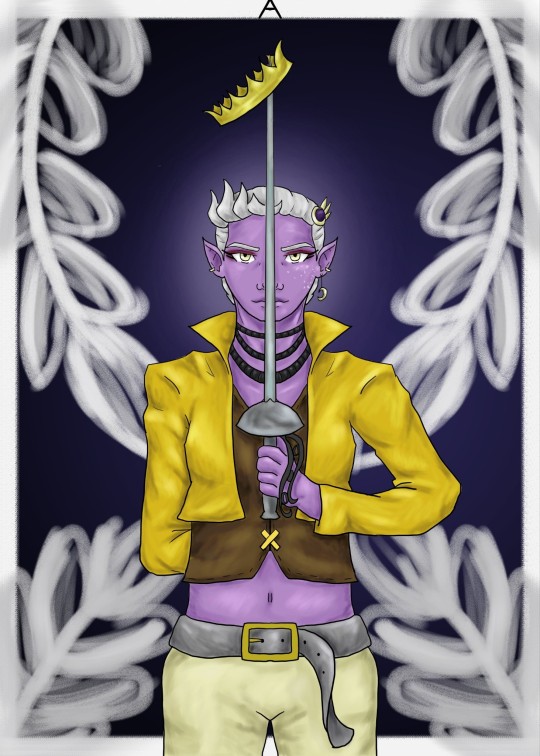
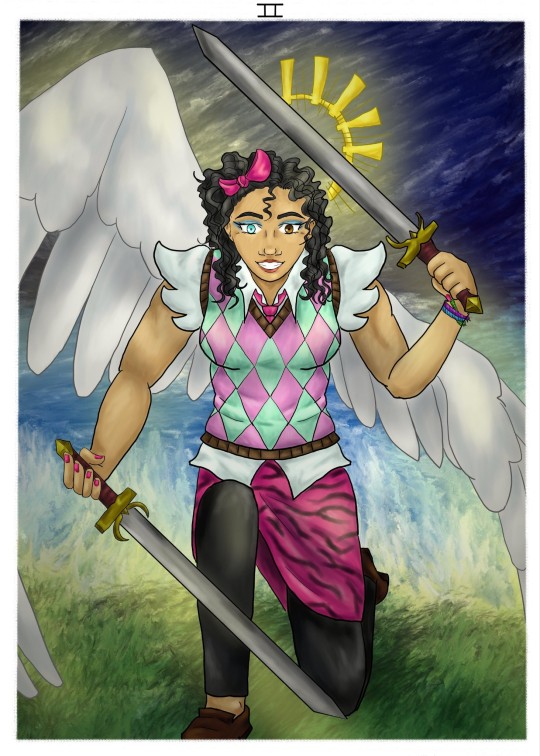
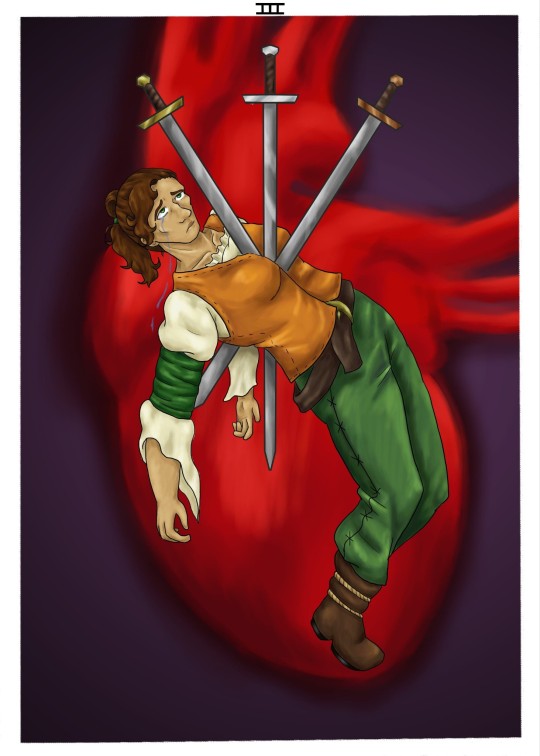
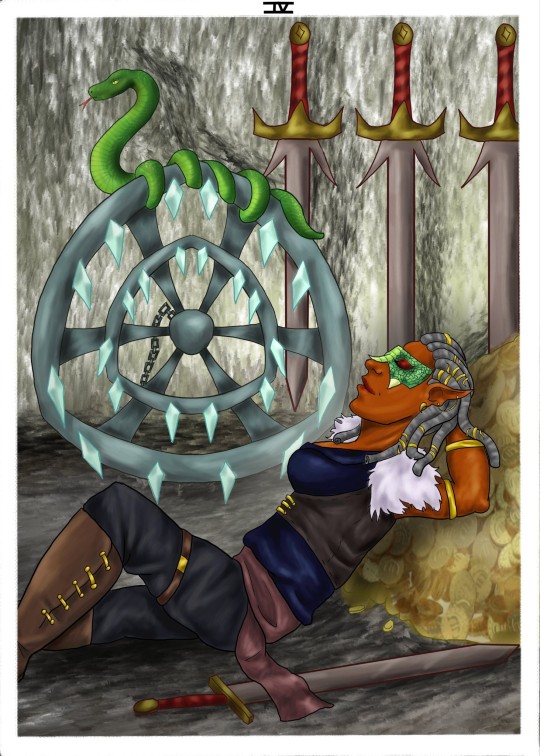
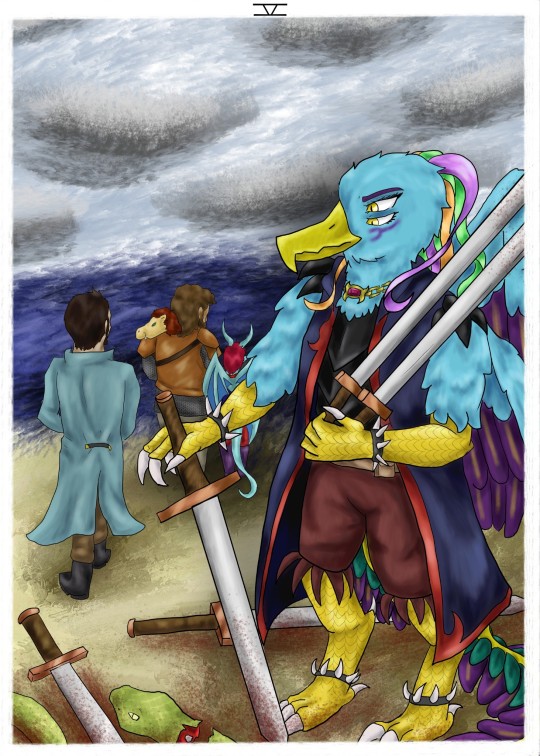
DM me if you are interested in ordering a commission. Payments will be handled through PayPal.
#commissions open#commissions#art commisions#tarot cards#tarot#dungons and dragons#dnd#ocs welcome#artists of tumblr#open commissions
93 notes
·
View notes
Text
D&D Stream TONIGHT!
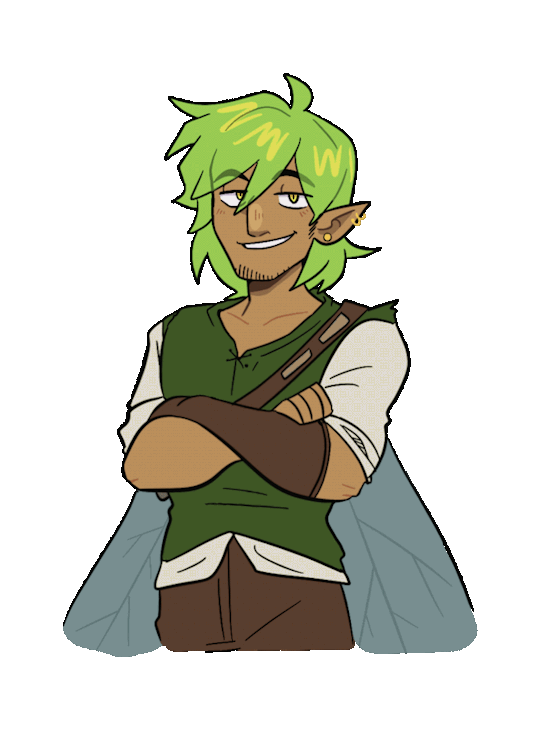
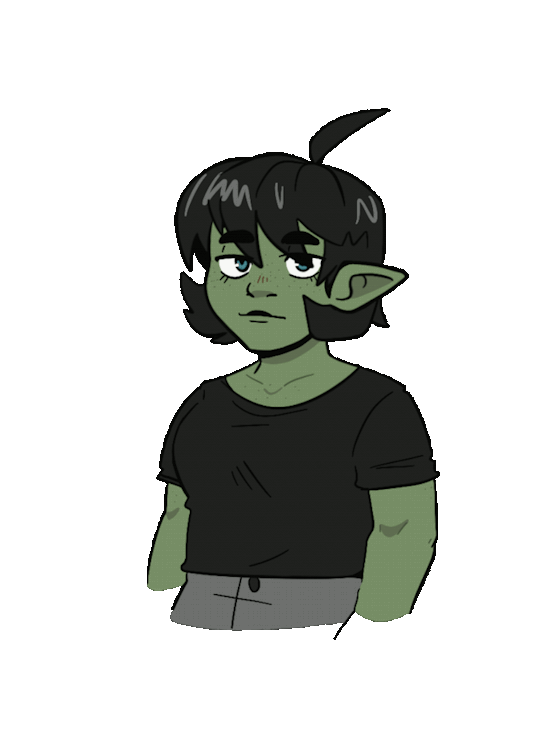

Have you ever been watching D&D stream and been like “boy i wish this looked like a visual novel.” Come watch our D&D stream Tonight at 8pm ET where the insane DM (me) decided to give a bunch of the NPCs interactive character art. please y’all i’ve sunk so much time into this lolll
#dungons and dragons#dnd#d&d#art#doodles#artists on tumblr#digital art#twitch#twitch stream#dnd stream#meta talks#gif#animation#fae#dnd npcs
61 notes
·
View notes
Text

Little orym doodle on magma
19 notes
·
View notes
Note
A big part of Eureka is splitting the party. Normally games are loathe to do this because of the potential to bore players while they passively watch others play the game. I'm curious how you deal with this when you run Eureka. Sending players away seems like it could make it either better or worse. Like if it's at a home, people can go hang out by the snack table and drink and chat, but that doesn't work as well at, say, a game store. I'm curious how people felt about having to leave the game several times.
While the risk of boring the players or putting too much stress on the GM is a real concern, the addage of "don't split the party" actually originated in the TSR D&D era, where splitting the party made them weak and vulnerable to all sorts of situations that would be less of a problem for a full strength party, However, for a game like Eureka that produces more conventional narratives (everyone take note that I did not say that Eureka produces more narrative or is "more focused on narrative", just more conventional narratives) and has more of a focus on intrigue and horror, the party splitting up to cover more ground and collect more clues in the limited time they have to solve the mystery, but also making each one of them more vulnerable if something happens, is an actual trade-off that can improve the gameplay and story.
First of all, besides it just being really entertaining, I really recommend you listen to the Tiny Table Actual Play of Eureka. It has some really good examples of splitting the party and sending players away that are executed really well, and also some good discussion of it in the post-mortem episode and the interview.
I’m going to answer the ask directly from my own gameplay experience, but I really really urge anyone who has played Eureka to comment with their own experiences with splitting the party and sending players away.
Alright, so, obviously how long players are willing to wait their turn is group-dependent, but with our own group, we’ve actually kinda had the opposite problem from players getting bored. Instead, Narrator and the players whose characters are currently in the spotlight start to worry that they’re selfishly hogging too much session time, and try to rush the scene along (to its great detriment), when in reality the players who were sitting out were happy to keep waiting. Realizing this led to us altering the advice regarding splitting the party in the rulebook, and actually recommending the Narrator go a little longer before switching to the other characters.
I personally am happy to wait up to like 90 minutes if my character is out of the scene, because I have faith in my group and also in Eureka that the payoff for waiting will be that much greater, seeing the characters relay what they have learned while they were apart in dialogue rather than the player just saying “My investigator tells them everything that happened.” It really heightens the tension, lets the characters shine, and can even really help with solving the mystery, because having the events and evidence recounted out loud can help with making connections that might have gone over people’s heads the first time.
Of course like the rulebook says, it also comes to the judgement of the play group as a whole, and should definitely be discussed beforehand basically as part of session zero, and even mid-session if it needs to be. (Communicate your preferences to your play group!!!!!) There’s plenty of scenes and situations where having the other players leave the room instead of sitting and watching would add nothing at all to the experience.
Now I want to hear other people’s opinions. If you have played Eureka and had a party split where some players left the room or otherwise excused themselves, how did it go?

#rpg#dnd5e#dungeons and dragons 5e#ad&d#osr#ttrpg#tabletop#ttrpg tumblr#indie ttrpg#ttrpg community#ttrpgs#ttrpg design#rpgs#urban fantasy#dm advice#gm advice#game master#dungeon master#dungeons & dragons#dungons and dragons#eureka#eureka: investigative urban fantasy
154 notes
·
View notes
Text
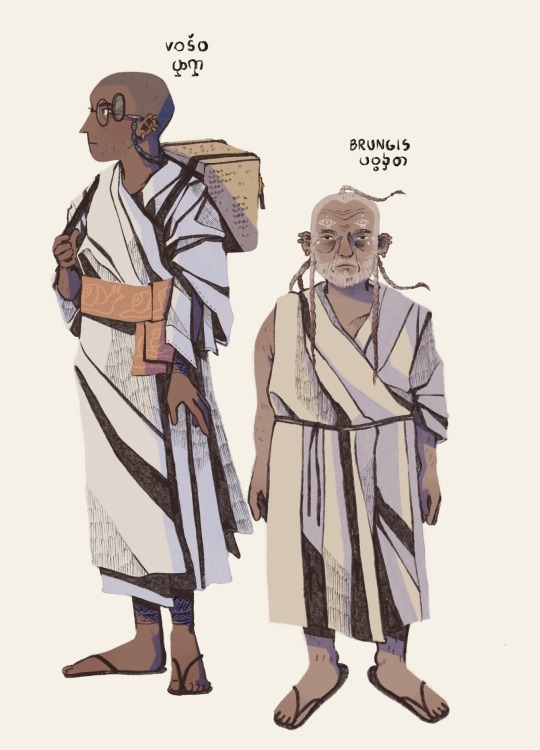
Once again I am RPG posting 😎
#art#illustration#drawing#digital art#fantasy#fantasy art#concept art#dungons and dragons#rpg#charaterillustration#charater design
241 notes
·
View notes